Current as of: March 4, 2026 - 16:03
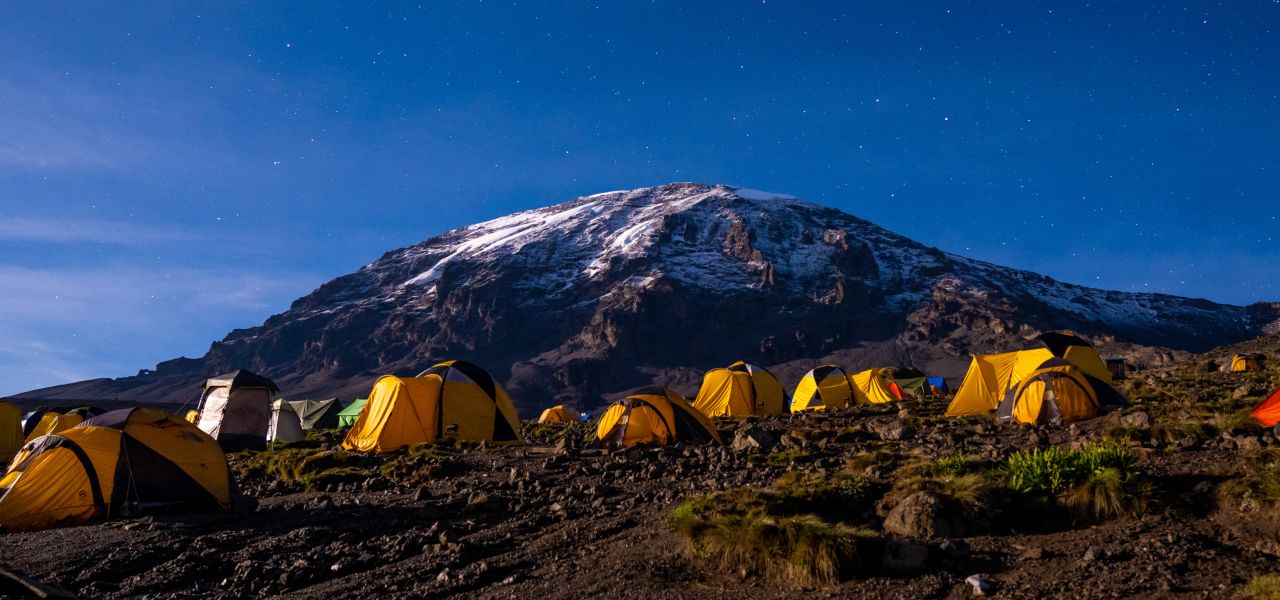
Kilimanjaro Climb - Lemosho Route Trip Notes
- Ways to Travel: Guided Group
- Destination: Tanzania
- Programmes: Walking & Trekking
-
Activity Level:
6 out of 7 - Challenging & Tough
- 10 Days: Land Only
- Ages: 16+
- Trip Code: TYR
- Carbon Footprint: 12kg CO2e
Trip Overview
Take the most scenic route up Africa’s tallest mountain, the adventure enhanced by our expert guides, porters and cooks
Scale Kilimanjaro on the Lemosho Route, considered the most beautiful of the seven established trails up Tanzania’s mightiest mountain. It’s no easy task, but this trip has been designed to maximise your chances of reaching Uhuru Peak at the very top – we have one of the best summit success rates of any operator here. Our eight days on the slopes is longer than most (allowing more time to acclimatise), while larger-than-normal tents, full porterage throughout and chef-prepped meals make the journey as comfortable as possible.
Why trek with us?
- One of the highest summit success rates of any operator on Kilimanjaro
- One guide to every two trekkers on summit day – essential for maximising your chances of reaching Uhuru Peak
- Acclimitisation day built into trip to improve success rates
- Larger-than-normal tents make the trek that little more comfortable
- Exodus is a member of the Kilimanjaro Porters Assistance Project, which aims to improve the working conditions of porters
- We’ll donate £25 to the Mountain Lioness Project for each person who books this trip
We also offer an alternative itinerary that climbs Kilimanjaro following the Rongai Route
At a Glance
- Full moon, new moon and female crew departures available (see Dates & Prices)
- Zanzibar and safari extensions available
Is This Trip for You?
The trip is rated Activity Level 6 (Challenging & Tough). For more information on our trip gradings please visit the Activity Level Guidelines page. If you have any queries about the difficulty of the trip please do not hesitate to contact us.
The summit attempt is graded Activity Level 7 (Tough) because of the high altitude and the level of physical effort needed. The rest of the trek is graded Activity Level 5 (Challenging), more because of the high altitude and extended wilderness camping than the difficulty of walking; hence the overall grading of this trek as Activity Level 6 (Challenging/Tough).
Walking conditions: This is a challenging trek, reaching an altitude of 19,340ft (5,895m). Even if you consider yourself fit, you might still find the climb very hard, depending on how well your body acclimatises to high altitude. There is no scientific way to determine how easily you will acclimatise; the acclimatisation process can also differ from climb to climb. Most of the trails on the Kilimanjaro trek are well defined and good quality but some forest sections are slippery and moorland paths can be very wet in poor weather conditions. The final ascent to Uhuru Peak is almost exclusively on scree and loose rock without permanent footpaths but no technical skills are required. During the trip, we spend time at both high and low altitude, experiencing both extremely cold and quite hot conditions. You should be prepared for an early start every day on Kilimanjaro.
Altitude: This trip spends time above 9,842ft (3,000m); please refer to the Altitude Warning within the Trip Notes for more information and advice on how to limit the effects of altitude sickness.
- Maximum altitude: 19,341ft (5,895m)
- Maximum sleeping altitude: 15,420ft (4,700m)
Equipment: It is essential you are well prepared for this adventure. Please review our Kilimanjaro Kit List to make sure you have all the items you need. The Essential Equipment section on the Trip Notes also provides more information on what you need to bring.
Under 18s: We believe this trek is manageable for a strong 16- or 17-year-old with previous experience of sustained trekking and possibly altitude. Under 18s should be accompanied by an adult on the trek and must pay an additional fee in advance (ask your sales representative for prices) for an accompanying guide. This guide provides support throughout and is available should they need to come off the mountain at any point in the trek.
Tanzania Flight Safety: The EU has recently introduced restrictions on all Tanzanian-registered flight operators. These restrictions are related to operational compliance by the Tanzanian Civil Aviation Authority, rather than to individual airlines themselves. On this itinerary, the only routes affected are the Zanzibar Extension travelling between Kilimanjaro and Zanzibar, or the optional hot air balloon flight. While domestic flying in Tanzania requires careful consideration, we want to reassure you that Exodus only works with Tanzanian carriers that are either accredited by internationally recognised safety auditing bodies (IOSA & ISSA) or have been approved by our independent aviation safety auditors. Independent audits include annual on-the-ground visits to carriers based in Tanzania. If any concerns arise about the safety of an airline on our approved list, we will immediately remove it from our operations and only reinstate it once our air-safety experts are satisfied that it meets the required standards.
Water safety: This trip includes time by a lake, river or sea, where there may be opportunities to swim. You should always seek local advice before deciding whether to swim. Open-water or wild swim spots should be treated with extreme caution. Information on how to keep yourself safe while swimming is shown here.
Group
Tour leader: Our leader is a licensed Kilimanjaro Chief Guide, and they will meet you upon arrival and hold a welcome briefing at the hotel on Day 1. On the Kilimanjaro climb, the leader is joined by assistant guides, cooks and porters.
Assistant guides: Exodus has a high guiding ratio on the mountain: one guide for every two trekkers. This is especially important on summit day where you may be feeling very tired. The guides are extremely experienced and are well trained in spotting the effects of altitude. Their guidance is key to maximising your chances of reaching the summit.
Adult min age: 16
Min group size: 4
Max group size: 16
Itinerary

Land Only
- Start City: Arusha
- End City: Arusha
Land Only Itinerary
The adventure begins at our much-loved hotel in Arusha, the gateway for your Kilimanjaro trek. Depending on your arrival time, you may have time for a dip in the pool or to relax in the lovely gardens.
Around 6pm, say jambo (that’s hello in Swahili) to your tour leader and fellow travellers, when we gather as a group for the first time to get to know each other and learn more about the adventures ahead. Meet your Kilimanjaro Chief Guide who will give a briefing on all aspects of the trip, including the distribution of any hired equipment you have booked. Please also bring your passport, insurance details and flight details.
Your tour leader then ensures a big Tanzanian welcome by arranging a group dinner together.
Want to extend your stay? Speak to your sales representative to book extra nights.
Accommodation: Moivaro Coffee Plantation Lodge (or similar)
We transfer (67mi/108km) to Lemosho entrance gate (6,890ft/2,100m) in the morning, passing between Kilimanjaro and the horseshoe-shaped volcanic crater of Mount Meru. In the short distance before reaching the Lemosho trail head gate, we drive through farmland and plantations. The last 3mi (5km) of the road to the park gate are poor quality, particularly after rain, and the drive there should be considered part of the adventure.
After completing the necessary registration formalities, we often have lunch in the designated tourist shelter before starting our walk. It is an easy day of walking up a small path through lush forest and an area with a variety of wildlife, including buffalos. We camp at Lemosho Forest camp (8,695ft/2,650m).
Accommodation: Full-service camping
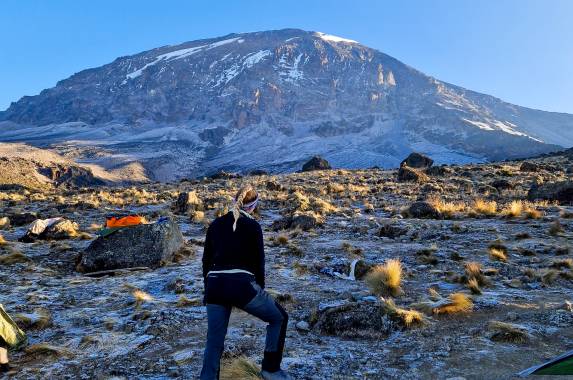
This morning begins, as all do on the trail, with hot tea brought to your tent – a very welcome wake-up. Today’s hike starts in lush montane forest before ascending into a moorland zone of giant heather. The trail climbs steadily with views across the plains, opening out as we reach the rim of the Shira Plateau. There is a tangible sense of wilderness here, especially if the afternoon mists cloak the landscape. We camp in the centre of the plateau at Shira One (11,645ft/3,550m).
Accommodation: Full-service camping

Enjoy a day to help acclimatisation and explore the grassy moorland and volcanic rock formations of the plateau. We walk to the summit of Shira Cathedral, a huge buttress of rock surrounded by steep spires and pinnacles. The views from our camp near Shira Hut (12,600ft/3,840m) of Mount Meru floating on the clouds are unforgettable. The afternoon is free to relax, enjoying those views and getting to know each other even better.
Accommodation: Full-service camping
We have a morning of gentle ascent and panoramic views, walking on lava ridges beneath the glaciers of the Western Breach. After lunch near the Lava Tower junction (14,930ft/4,550m), we descend to the bottom of the Great Barranco valley (12,795ft/3,900m), sheltered by towering cliffs and with extensive views of the plains far below, including the Barranco Wall, which we tackle tomorrow.
Accommodation: Full-service camping
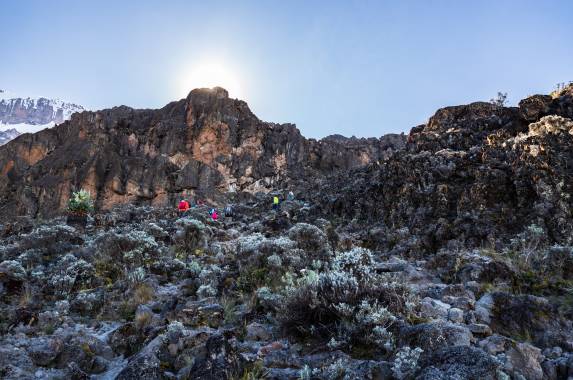
A short, steep scramble up the famed Barranco Wall provides us with a different challenge and leads us to an undulating trail on the southeastern flank of Kibo, with superb vistas of the southern icefields. The terrain changes to volcanic scree, with pockets of lush vegetation in sheltered hollows, and a powerful sense of mountain wilderness.
Our next camp is at Karanga (13,125ft/4,000m), a short distance away. The valley floor has the last water point on the approach to Barafu and we camp on the higher sides of the valley with views towards the glaciers of the southern icefields.
Accommodation: Full-service camping
The trail follows a path on compacted scree with wide views ahead including the Barafu Ridge, where our camp lies. The trail climbs to reach the Barafu campsite (15,090ft/4,600m) for lunch, after which there is a short acclimatisation walk to the plateau at the bottom of the southeast valley (15,750ft/4,800m). The remainder of the day is spent resting in preparation for the final ascent and includes a very early night.
Accommodation: Full-service camping
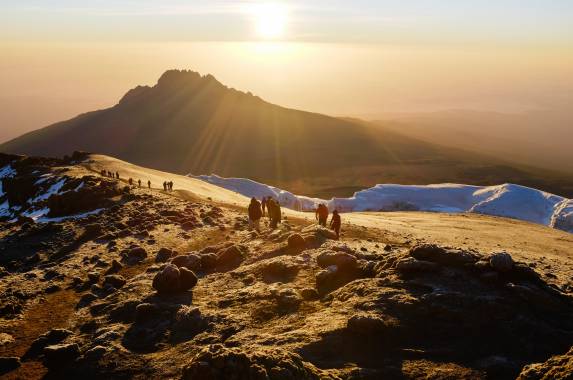
We start our ascent around midnight so we can reach the crater rim by sunrise. The steep climb over loose volcanic scree has some well-graded zigzags and a slow but steady pace takes us to Stella Point (18,815ft/5,735m) in about five or six hours. We rest there for a short time to enjoy sunrise over Mawenzi.
Those who are still feeling strong can make the two-hour round trip from here along the crater rim to Uhuru Peak (19,340ft/5,895m) – congratulations, you’ve made it! Standing at the highest point in Africa, taking your photo at the Uhuru Peak sign and knowing you have climbed one of the Seven Summits is a moment that will stay with you forever!
The descent to Barafu is surprisingly fast; after some refreshments, we continue to descend to reach our final campsite (12,470ft/3,800m) at Millennium Camp.
Accommodation: Full-service camping
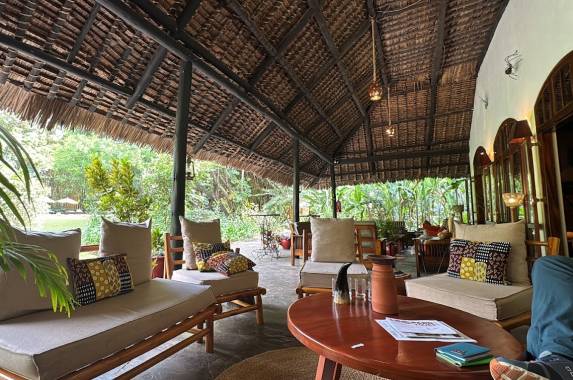
Today is a sustained descent on a well-constructed path through lovely tropical forest alive with birdsong and lush undergrowth with considerable botanical interest. Our route winds down to the national park gate at Mweka (5,415ft/1,650m) where we meet our vehicle and drive through coffee and banana farms to Mweka village. The shower, beer and swimming pool are tantalisingly close! We return by bus (62mi/100km) to Arusha.
Accommodation: Moivaro Coffee Plantation Lodge (or similar)
Spend this morning resting in the hotel garden by the pool or exploring Arusha for souvenirs if you have time before your flight home.
Alternatively, if you’d like to recuperate after climbing Kili, speak to your sales representative to book a relaxing break on idyllic Zanzibar or an unforgettable safari adventure encompassing three different national parks.
Extend Your Trip
Zanzibar Hotels
With its white-sand beaches, warm turquoise waters and a rich blend of African, Arab and Indian influences, Zanzibar is a place where relaxation meets culture in the most magical way. Make your adventure feel even more extraordinary with additional time to discover Zanzibar. Here are a few of our favourite hotels to inspire your stay:
Hotel Riu Palace, Zanzibar: Located on the powder-soft sands of Nungwi Beach, this luxurious beachfront resort offers elegant suites, infinity pools and an excellent all-inclusive programme. With vibrant coral reefs just offshore and spectacular sunsets, it’s ideal for travellers seeking a refined yet relaxed beach escape.
Sea Cliff Resort and Spa, Zanzibar: Perched on a cliff overlooking the Indian Ocean, this tranquil resort blends Swahili-inspired architecture with gardens and panoramic ocean views. Its spacious rooms, two infinity pools, and indulgent spa make it perfect for unwinding.
LUX* Marijani, Zanzibar: This elegant beachfront retreat blends contemporary design with that signature LUX* sense of barefoot luxury. With crystal-clear lagoon waters, exceptional dining and warm, personalised service, it offers a stylish ending to your adventure.
This is just a glimpse of what’s possible. Speak to your sales representative, who can guide you through the options and arrange everything for you.
Safari Add-on Tour - after Lemosho Route
This add-on tour is the perfect introduction to the wildlife of Africa, taking in three unique national parks over three days. The Ngorongoro Conservation Area provides acts like a giant enclosure, providing refuge and habitat for a vast number of animals. Tarangire National Park has the largest number of elephants in the northern part of Tanzania and is dotted with baobab trees. Finally, Lake Manyara National Park is small but supports a high density of mammals including tree-climbing lions.
The detailed itinerary is here, or speak to your sales representative for more details.
Altitude Warning: This trip includes one or more nights over 9,845ft (3,000m) above sea level, where there is a genuine risk of being affected by acute altitude illnesses; if left untreated, this can be life-threatening. Most should expect to experience some mild symptoms of altitude sickness, such as headaches, shortness of breath or sleeplessness. Our leaders are trained to identify symptoms of severe altitude illnesses and, if a customer requires extra care, arrangements such as a rapid descent will be made.
Exodus itineraries are informed by the Wilderness Medical Society (WMS) Guidelines for the Prevention of Altitude Illnesses and designed to allow for adequate acclimatisation. Due to terrain and/or logistical factors, there may be nights where the sleeping altitude gain is more than 1,640ft (500m), increasing the risk. The WMS highlight that because the rates of acclimatisation and physiologic responses to high altitude vary considerably between individuals, the recommendations given, although generally effective, do not guarantee successful prevention. Participants should be aware of the inherent risk posed by altitude.
Several medical conditions or medications can affect a person’s ability to acclimatise, making them more susceptible to acute altitude illnesses. Those with pre-existing conditions, such as heart or lung conditions, those who have suffered with altitude sickness before, or those with concerns about overall physical ability, should consult their doctor before booking. The drug Diamox (acetazolamide) may aid acclimatisation in some individuals. Those considering using Diamox should speak to their doctor about the drug, its suitability, side-effects, and a prescription. Please note, while we endeavour to assist all our customers in achieving their goals, there may be times when a leader decides to delay or stop someone’s ascent based on their condition.
If you are not taking out the Exodus Travel Insurance policy from our partner Campbell Irvine, please make sure your policy covers you up to the maximum altitude on this trip (if trekking in the Himalayas, your policy should also cover the use of a helicopter for emergency medical evacuation).
Accommodation
Moivaro Coffee Plantation Lodge and Kilimanjaro camps
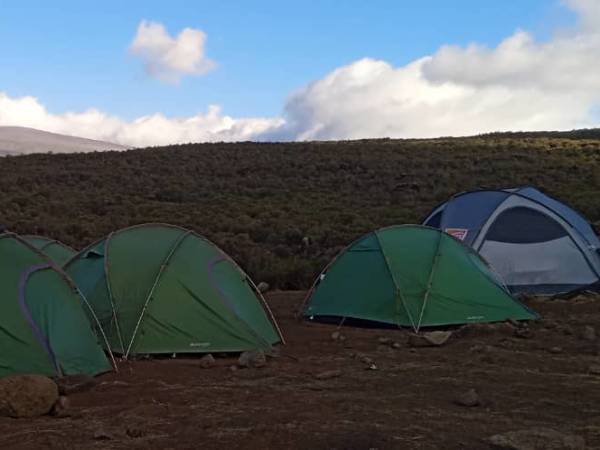
On this adventure, we spend seven nights camping in three-person tents and two nights in a hotel.
Arusha: Moivaro Coffee Plantation Lodge (nights 1 and 9)

Before and after our time on Kilimanjaro, we stay at the Moivaro Coffee Plantation Lodge. In a peaceful setting just outside Arusha, this property has 40 spacious thatched cottages dotted throughout a beautiful garden overlooked by Mount Meru. There’s also an excellent restaurant serving African and international dishes, a bar and a swimming pool. It is also possible to book a massage for when you return from the trek.
Kilimanjaro: Full-service camping (nights 2-8)
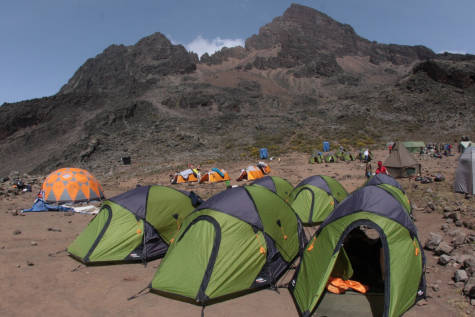
Although conditions are basic on the mountain, the camping we experience is one of the best available on the Lemosho Route. We sleep in Vango Halo Pro 300 tents regardless of whether you have made a twin-share or single supplement booking. These are spacious three-person tents that are ideal for the conditions on Kilimanjaro. Our camp life is about as comfortable as it gets on Kili, with a communal mess tent, where we gather as a group and eat breakfast and dinner, and a private toilet tent. We also ensure there is a bowl of hot washing water for you in the morning and again after the walk at an agreed time in the afternoon. The only exception is the highest camp where there is no water source.
Worth knowing
- The campsites on Kilimanjaro are designated by the national park and are mainly stone/dirt. They are not all level and can be crowded in peak season.
- Handwashing water, treated with Dettol, is available along with soap before all meals, and everyone is strongly advised to make use of it.
- The toilet tent has toilet paper within it, but we recommend that you bring your own toilet paper and wet wipes.
- All camping equipment is provided except for sleeping bags, sleeping mats and pillows.
Single supplement from £ 375
Food & Drink
All meals during the climb are included. Please allow about US$30-US$50 for the two lunches (days 1 and 10) not included.
On trek, the emphasis is on a varied and well-balanced diet with a greater amount of fresh fruit and soup to maximise the daily intake of fluids.
Vegetarians are well catered for but please inform us before departure of any special dietary requests. The availability of certain specialised products for restricted diets, eg gluten-free or dairy-free, is minimal or non-existent in Tanzania and we strongly recommend you bring these specialised dietary items from home.
The menu has a high liquid and carbohydrate content, the two important elements for successful climbing. At higher altitudes, stimulants (such as coffee) and less digestible foods (such as meat) are not recommended. Our evening meal at the highest camp on Kilimanjaro is a meatless stew as our experience shows this to be the ideal preparation for the summit day. At mealtimes, a selection of hot drinks is available. Soup is served twice daily.
Daily meals
- Bed tea: Tea or coffee served in your tent.
- Breakfast: Seasonal fresh fruit (mango/banana/watermelon), porridge, cooked eggs, sausage, bacon and toast.
- Energy snacks, such as biscuits, bananas and chocolate bars, are provided for the daily walk
- Lunch: Either a packed lunch on longer days or, more usually, a hot lunch served in camp by a small team who have raced ahead of the clients. A hot lunch typically consists of soup, bread or pancakes, cheese, tuna, jam, peanut butter, pasta salad and cake.
- Afternoon tea: Served in late afternoon. It is an opportunity to drink lots of hot drinks and snack on peanuts or popcorn.
- Dinner: The main meal of the day and always consists of three courses: soup and bread, followed by the main dish, which could be rice, potatoes or pasta with fish, meat or vegetables, and is followed by a dessert often of fruit.
- Summit snacks: While we provide enough food for the climb, we recommend you bring some of your favourite snacks and keep them for the summit day. The summit day is a long, tough climb and having your favourite snacks can provide a very welcome boost.
Water
While the water we provide on Kilimanjaro is suitable for drinking you may wish to be extra safe and treat it with your own water-purification tablets.
Transport
All transfers are usually by private minibus or bus depending on the group size.
Weather & Seasonality
Although Tanzania lies in the tropics, the temperature depends more on altitude than on season. Northern Tanzania has temperatures around 16C-23C (61F-73F) in August, rising to 18C-28C (64F-82F) in February. The long rains, during which we do not operate trips, occur from late March to May, and there are intermittent short rains in November and December, though the latter have no great effect on mountain climbs.
Kilimanjaro can be climbed at any time of the year, but it is usually very wet in the rainforest in April and May. January and February are the warmest months. Above the cloud line, the days are warm and pleasant, with temperatures in sunlight often above 20C (68F), but the nights can get very cold. It is possible for temperatures to get as low as -20C (-4F) at Barafu campsite, our highest overnight stop. The daily weather pattern on the mountain tends to be clear mornings with an afternoon cloud build-up that often clears before sunset. In the (European) summer, the weather is usually cloudy at lower altitudes and often sunny above 11,480ft (3,500m). Please note, mountain weather conditions are never totally predictable and we may meet wet and snowy conditions at any time.
Joining Instructions
Key information
Recommended arrival time: There is a welcome briefing around 6pm at the start hotel. Hotel check‐in is normally from around midday.
Airport: Kilimanjaro International Airport (JRO)
Getting to the start hotel
The start hotel is approximately a one-hour drive from the airport depending on traffic. We provide one group transfer from the airport to the hotel, which you can join at no extra cost, provided you can be at the airport before the transfer leaves. Speak to your sales representative for the transfer times or to arrange a private transfer.
Catching your return flight
There’s one group transfer to Kilimanjaro International Airport, which you can join at no extra cost. Please speak to your sales representative for the time of the transfer. If the group transfer does not suit your flight time, speak to your sales representative to arrange an alternative.
Full joining instructions including local emergency numbers will be sent to you as part of our Final Joining Instructions. If you do not receive these at least a week before departure, or require them earlier please contact our office or your travel agent.
Location start: Arusha
Location end: Arusha
What To Take
Essential Equipment
It is essential you are well prepared for this adventure. Please review our Kilimanjaro Kit List to make sure you have all the items you need.
All camping equipment is provided except for your own personal equipment. Certain items, such as duvet jackets, sleeping bags and thick mattresses, can be hired through our local agents. These must be pre-booked through the Exodus office to ensure availability. Please call for details.
Below are the items you need:
- Four/five-season sleeping bag
- Sleeping mat
- Good boots well worn-in (leather recommended)
- Four/five-season duvet jacket
- Walking poles
- Fleece jacket or equivalent, warm sweater(s)
- Thermal underwear
- Two large water bottles
- Waterproof jacket and trousers (pants)
- Two pairs of gloves
- Warm hat or balaclava
- Sunglasses and sun hat
- High-factor (at least 30+) sunscreen for the twin exposure to high altitude and equatorial sun
- Thick socks
- Headtorch (head lamp) with spare batteries – possible freezing temperatures at altitude can affect your batteries, so we recommend a couple of spare sets
- 30-40 litre backpack for the day
- We recommend summit snacks (see food section)
- First-aid kit – a first-aid kit is carried on each trek, but you should bring you own with diarrhoea treatment, painkillers, rehydration sachets, insect repellent with DEET, plasters (band-aids) and a blister-treatment kit.
Equipment hire: The following equipment can be hired prior to your trip. Please take the weight into account when packing due to the porterage weight limit. Hire equipment should be requested in advance of travel to ensure availability but will be provided locally.
- Down jacket (approximately 1.65kg)
- Four-season sleeping bag (approximately 2kg)
All luggage for the Kilimanjaro climb should be packed in a soft kitbag. The weight limit on trek is 33lb (15kg). This does not include your backpack for the day. Clean clothes and other items can be left at the hotel in Arusha.
VERY IMPORTANT: In case of lost luggage, it is vital you take essential climbing equipment such as boots and clothes in your 30-40 litre backpack and travel with this as hand luggage. Should this kit go missing en route to Kilimanjaro, it will seriously affect your trip.
Plastic bags: Tanzania and Zanzibar have banned the use of plastic carrier bags and certain other plastic bags. Travellers arriving into either by airports, sea ports or land borders must leave any bags deemed to be on the banned list at the point of entry and risk facing heavy fines.
Equipment hire partners: We have partnered with the following outdoor specialist for great rates on expedition kit hire (UK-based customers only) or just general advice and guidance on the best kit and equipment needed for your trek.
- TrekHire: Offers Exodus customers a four-week hire period for their technical gear, including items such as down sleeping bags (which includes cleaning costs). This extended hire period gives you ample time to prepare and return your gear after your trip. TrekHire also provides assistance with reviewing your kit list, offering advice on how to use your gear, and recommending what to buy or avoid. Additionally, they own a shop called Surrey Trek and Run, where you can enjoy a 10% discount on in-store items (excluding walking boots).
- Expedition Kit Hire: Offers a 10% discount on hire prices for Exodus customers (excluding already discounted pre-made package deal kit lists, such as those for Kilimanjaro and Everest Basecamp). For extended hires (beyond the standard two-week hire), they offer a reduced daily rate, which often provides savings greater than 10%. Please ask our Customer Operations team for the Exodus customer discount code.
Exodus kitbag: If you book this trip, we provide a free Exodus kitbag to pack your luggage in while on trek. Once you have booked, you will be sent instructions on how to claim your bag (they are not sent automatically). Please note, if you book less than three weeks before the departure date, we cannot guarantee your kitbag will arrive before your trip starts. If this is the case, please contact us on customerops@exodus.co.uk (or customeroperations@exodustravels.com if you’re based in the US or Canada). See www.exodus.co.uk/kitbags for full T&Cs.
Optional Equipment
- Entertainment for the evenings: book, playing cards or games etc
- Lip balm
- Portable charger
- Drying line
Reading List
Maps
West Col productions has printed an excellent map and guide to Kilimanjaro (1:75 000). This map is generally available from good map/book shops. There is also a good Bartholomew East Africa map. Locally produced maps of Kilimanjaro are available in Marangu, as is a revised version of the West Col map at a scale of 1:50000
Practical Information
Visa
Tanzania
Travellers from the UK, US and EU normally need a visa to enter Tanzania. Please note, visa requirements often change and it is your responsibility to obtain any required visas for this trip. Therefore, we recommend that you check with the nearest embassy or consulate of your chosen destination(s), including any countries you may be transiting or transferring through.
Some local governments provide guidance on what visas their citizens need. To help, we’ve gathered a selection of useful links below.
- Australia: www.smartraveller.gov.au/destinations/africa/tanzania
- Canada: www.travel.gc.ca/destinations/tanzania
- United Kingdom: www.gov.uk/foreign-travel-advice/tanzania/entry-requirements
- USA: www.travel.state.gov/content/travel/en/international-travel/International-Travel-Country-Information-Pages/Tanzania.html
Please note, it is possible to get the visa online (from US$50), but this can take between 10 days and three weeks. For more information and to apply for the visa, please visit www.visa.immigration.go.tz. If you are flying into Kilimanjaro Airport, we recommend arranging the visa in advance as the visa-on-arrival process has become more complicated and can now take longer.
Vaccinations and Health
Tanzania
There are no required vaccinations. However, you may want to consider vaccinations for hepatitis A, tetanus, typhoid, cholera, hepatitis B, meningococcal disease, rabies, tuberculosis and yellow fever. Protection against malaria is essential. Please seek advice from your doctor or travel clinic on the best course of action for all the above. Additionally, dengue fever, a tropical viral disease spread by daytime biting mosquitoes, is a known risk. There is currently no vaccine or prophylaxis available, so we recommend you take the usual precautions to avoid mosquito bites.
You may also be required to show a yellow fever vaccination certificate (or an exemption certificate) if you’re coming from (or transiting for more than 12 hours through) a country with risk of yellow fever transmission. If you’re visiting Zanzibar from mainland Tanzania, border officials have been known to demand proof of yellow fever vaccination or an exemption certificate.
Malaria prophylaxis is essential on this trip, and we suggest that you seek advice from your GP or travel health clinic about which malaria tablets to take.
Bilharzia is known to occur in some of the lakes or rivers visited on this itinerary, we therefore advise all to take advice from your guide or leader locally before venturing for a swim.
Dengue fever and/or chikungunya are known risks in places visited on this trip. Both are tropical viral diseases spread by daytime biting mosquitoes. There is currently no vaccine or prophylaxis available for either, and therefore the best form of prevention is to avoid being bitten. We recommend you take the usual precautions to avoid mosquito bites.
Local Time
Tanzania's time zone: Africa/Dar_es_Salaam (UTC +03:00)
Electricity
No facilities are available to recharge batteries while on trek.
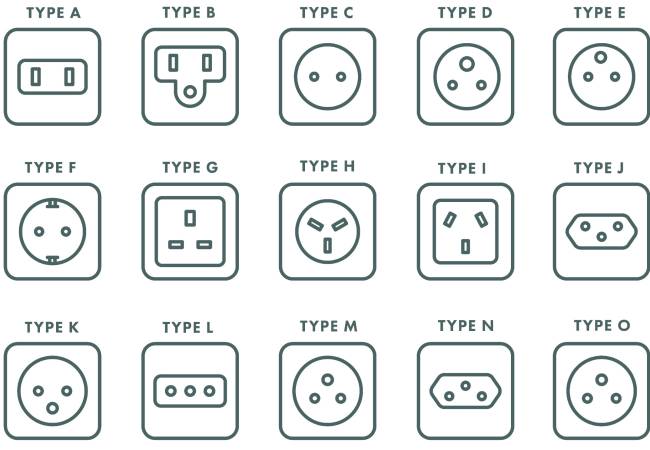
Money
Tanzania's currency: Tanzanian shilling (TZS). However, we recommend you take most of your money in US dollars issued from 2009 or after with the big head design. Please note, Tanzanian shillings may not be imported or exported. There is no restriction on the import of foreign currency provided it is declared on arrival. On leaving Tanzania, you may convert any amount of shillings into hard currency provided you have a currency exchange receipt.
ATM Availability
There are ATMs in Arusha but it’s best not rely on these as there are regular power cuts. Credit cards are accepted at the lodge in Arusha and some other places but note there is often a service charge for their use.
We recommend changing some money at the airport in Kilimanjaro on arrival.
Extra Expenses & Spending Money
Luggage to be carried by porters on the Kilimanjaro trek is limited to 33lb (15kg) per person. If you wish to take extra luggage, allow US$185 per porter, which is payable in US dollars cash to our local agents at the start of the trip.
It is impossible to spend a lot of money on the mountain climb but both alcohol and souvenirs are readily available in Arusha.
- Beer: Approximately US$3
- Mineral water: Approximately US$2
If anyone needs to leave the group at any point during the trip (for reasons such as an early descent from Kilimanjaro due to altitude sickness), all expenses incurred until rejoining the group on the itinerary described in these Trip Notes are the responsibility of the individual(s) concerned and should be paid directly to our local operators before leaving Tanzania.
Altox personal oxygen system: £367 (subject to change). This is designed to help close the altitude gap between the top camp and the summit.
The pack includes:
- 2 x oxygen cylinders (each cylinder gives 12 hours’ endurance)
- 1 x oxygen regulator
- 1 x pulse dose delivery system
- 1 x silicone nasal cannula
- 1 x personal backpack
An additional porter is required to carry the system. The complete system is supplied in a protective Pelicase and backpack, carried by your porter. Guides are all fully trained in the use of the system.
Tipping
Our local staff are paid fairly for their work but tipping has become customary in Tanzania with the increase in tourism. The local staff will expect some gratuity and we suggest you allow for this.
Tipping kitty: On arrival, the tour leader will suggest to the group that they donate between US$210 and US$235 per person for all the staff on Kilimanjaro. This money is then used to tip the guides, cook and porters. How the tips are distributed will be explained in the pre-trip briefing. This method is the smoothest way to ensure all crew on the mountain receive the right amount. In addition, it is also normal to give small tips in restaurants and to luggage porters and drivers.
If there are trainee guides on your departure, please note that their tips are being covered by the Exodus Travels Foundation and so they will not be included in the group tip.
Kindly ensure you have US dollars in a range of denominations to contribute, as other currencies are not much use in Tanzania.
Sustainability and Impact
As a certified B Corp, we’re on a mission to improve our social and environmental impact across all our adventures.
We do this through our innovative Thriving Nature, Thriving People plan.
This ‘nature positive’ approach is designed to help nature and communities thrive in harmony through practical solutions, such as reducing carbon and waste on our trips, supporting conservation projects through the Exodus Adventure Travels Foundation, and rewilding 100 square metres for every Exodus traveller.
Full Moon departures: Several dates throughout the year coincide with a full moon. We schedule them in line with flights and the best time of year to climb. The complete full moon may take place a few days before or after summit day and this can vary across the departures. It means the final ascent will be lit up by the moon’s glow on a clear night.
New Moon Departures: A number of departures also coincide with the new moon. This may take place a few days before or after summit day. Without the light of the moon, Kilimanjaro is an excellent site for stargazing.
Female Crew Departures: On these dates, our crews typically consist of one or two female guides, a female cook and 10-20 female porters. Please note that male crew are also present on these departures. To learn more about how we support female porters, please follow this link: www.exodus.co.uk/mountain-lioness-scholarship. In addition to this, we include a minimum of four female crew on every other departure.
Important Information
Your Safe Participation
When booking this trip, you should be confident in your ability to participate in all activities described in these Trip Notes. If you have any doubt about your suitability, please call us and ask to speak to one of the experts on this itinerary.
Although our leaders are well trained to deal with different capabilities, if they have any concerns about someone’s ability to safely take part in an activity, or their impact on other people’s enjoyment, we authorise them to take necessary action which, in some circumstances, may involve asking someone to miss that activity.
By booking this trip you agree to our Booking Conditions which clearly state that our leaders have the authority to do this. In these rare instances we will ensure anyone sitting out is safely provided for and offered alternative options where possible. Refunds will not be provided for activities missed and customers may be liable for additional costs incurred.
Seatbelts
All vehicles used by us should be equipped with working seatbelts, except where approved by us based on the vehicle type or journey. Wherever seatbelts are available, we require our customers to use them for their own safety, even where it may not be a legal requirement.
Travel Safety
For additional information please have a look at the travel safety advice page on our website.
How to Book
Speak to our friendly team of experts to plan your adventure:
- Check availability: our website shows real-time availability of our guided group tours, or contact our team by phone, email or live chat.
- Hold a space: You can provisionally hold a space on any guided group tour to give you time to finalise your travel plans.
- Confirm your booking: Payment of a deposit will complete your booking and secure your place on the trip.
After booking
You will receive a confirmation document and invoice, which includes extra information and guidance about your travel arrangements. Our dedicated Customer Operations team will help you with any pre-travel questions or arrangements and can easily add extensions or extra accommodation to your booking. Final Joining Instructions will usually be sent out two to three weeks prior to departure.
Adding transfers to your booking
If you have arranged your own flights and would like to add transfers to your booking, please provide your arrival and departure details to our Customer Operations team around four to six weeks before departure.
- Where free transfers are included, they are available for any flight but can only be added to your booking once we have received your flight schedule.
- Where group arrival and departure transfers are available, these operate at fixed times. You will need to arrive in time to meet the scheduled transfer. If the timings don’t align with your travel plans, our team can arrange private transfers once they receive your flight schedule.
Trip Note validity
Trip notes may be updated after booking; if any updates significantly impact the inclusions or itinerary you will be advised in writing. A link to the most up-to-date Trip Notes will be sent out with your Final Joining Instructions before departure.
The information in these Trip Notes is given in good faith. All holidays can be subject to unexpected changes, and occasionally it may not be possible to follow the itinerary as planned. In these circumstances we will make the best-possible alternative arrangements that maintain the integrity of the original itinerary.

